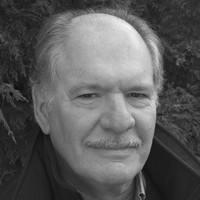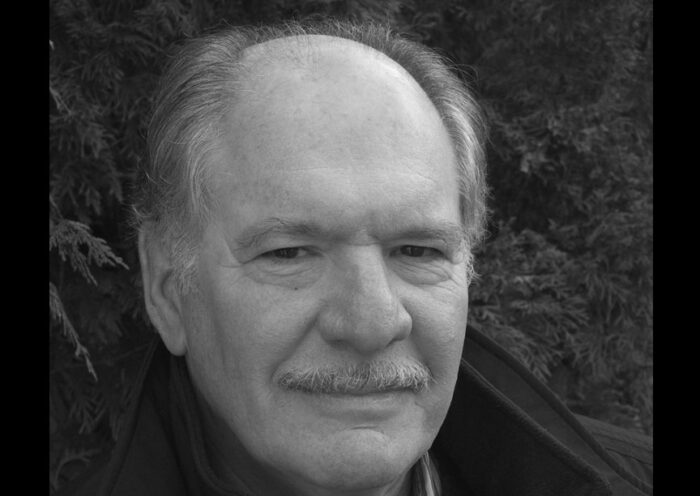The Preterite
by Frederick Pollack
You’ve been called in to construct
a language. You should feel flattered,
perhaps honored, that they chose you
despite your amateurism. What worries you
is theirs: vital texts
are missing from shelves and computer.
Meals are slow and cold.
The girl assigned to help you is eager
when there, but never there. You wonder if
she loathes you. With the instincts imparted
by age and marginality, you wonder
if you were selected simply
to get language and/or you out of the way.
But that’s upsetting; you immerse yourself
in the advantages and disadvantages
of agglutinative, fusional … Zamenhof
was eurocentric; you want to bring in
that Japanese noun for the sound of a pencil
rolling across a table, a Warrumungu expression
for thirst that brought you to tears, once …
What’s worst is they never told you
whether they want something ideal
or pragmatic, mere trade-talk. Given
your nature and the effects
of solitude you tend towards the ideal:
that harmony Leibniz convinced himself
the West would achieve by imitating
Mandarin. Your notebooks fill
with ideograms, vast melded radiating
concepts. All seem based
on reddened eyes, a haunted spotted hand.
Plein Air
Raying along the short blocks
beneath the usual big cloud
(like the belly, I think, of a boar),
the westering light creates
a Wagner-effect that is almost
too much. The rubble-slides
twinkle from glass;
I’ll omit most of that
and the rays, but retain,
inevitably, the upended, somehow
embarrassed vehicles,
the crater ponds.
Some trace in the air affects
my oils, but this adds
an aleatoric kick. And I’m never
quite sure what I’m seeing through
the mask. At Times Square,
all paper posters
are torn (they’ve been done), but
the looming Black Squares
that used to throb with ads lend
a focus, can be made to have
poignance, as if longing for
an image, any image.
Eye of the Denier
The years, high double digit, are
a weight, a block – what can you do
with that? But the days
were many; it’s easy enough
to multiply, and then you have
such a wealth! You could even
obtain a blank set
of calendars, from an environmental
NGO, spread them over
a floor and discover the animals
mysteriously linked to
your months, some gone now.
And from the little empty squares, like a mole
peering out, a bird who nests in earth,
a mouse among rocks or a small or
large cat, the true
protagonist of those days
would emerge – you could peer down at him
making love
and money, successfully striking
foes and poses,
disdainful of your gaze and the flat white world.
The Harbor Cruise
Half a kilometer past
the marina, the boat turns east,
and as it parallels the shore, the lights
that gild the walls of hotels, casinos,
seafront mansions, and those
of looming inland office buildings
go on more or less at once. Overwhelming
tourists aboard with magic:
the calm sea calmer, air cooler with dusk, the boat
turning, the lights – all for them! While older
locals, here to rekindle whatever,
applaud a successful expensive effect.
The captain, alert to his radar, avoids
yachts entering and leaving, heedlessly,
the harbor, a cruise ship’s wake. Young
guests, mostly rich and native,
perceive the lights as a signal for something,
though unsure what it is besides drinking.
And as all crowd the bar and table,
the distinction between those wearing
tuxedos and those in shorts and T-shirts
increasingly galls the old, diverts
the young who notice. Holding
glasses and plates, the groups separate,
tourists distinct in each; but in
the romantic darkness all are merely
shapes, with the lights of the city reaching
for them across the water. Seeing
bits of the young, the nicer old
attempt to forgive their laughter. Seeing
them, the young at most recall
superiors to get around.
Some figures, outfits, and the sea are noted.
One of the old remembers
lighting a cigarette in darkness; thinks,
If I could do that now I would be real.
BIO
Frederick Pollack is the author of two book-length narrative poems, THE ADVENTURE and HAPPINESS, both Story Line Press; the former reissued 2022 by Red Hen Press. Three collections of shorter poems, A POVERTY OF WORDS, (Prolific Press, 2015), LANDSCAPE WITH MUTANT (Smokestack Books, UK, 2018), and THE BEAUTIFUL LOSSES (Better Than Starbucks Books, September 2023). Pollack has appeared in Salmagundi, Poetry Salzburg Review, The Fish Anthology (Ireland), Magma (UK), Bateau, Fulcrum, Chiron Review, Chicago Quarterly Review, etc. Online, poems have appeared in Big Bridge, Hamilton Stone Review, BlazeVox, The New Hampshire Review, Mudlark, Rat’s Ass Review, Faircloth Review, Triggerfish, etc. Website: www.frederickpollack.com

















